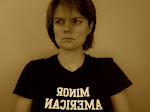


When I lived in Berlin from 1995 to 1997, I frequented the literature houses in the city often. I had the luck of hearing Ernst Jandl and Friederike Mayröcker, but the reading that struck me most was given by the Danish poet, Inger Christensen. (She is the woman in the picture on the left above). She read during a group reading. She was already an older woman with something grandmotherly about her. She came to the stage in what my mother in Polish calls a "costume," that is, in a skirt with matching blazer. She was dressed all in brown, looked very much like the older women I saw everyday on the Berlin subway and when she came to the stage with a large handbag that she set on the floor next to her, I found the image of this poet quite funny, exactly because she didn't look like a poet at all, at least according to my twenty-three-year-old self. But then she began reading sonnets from her cycle The Butterfly Requiem and I felt truly stupid for my earlier judgment of this woman's appearance. All I can say is that the poems were magical. As earthly and mundane as Christensen's appearance seemed, her poems were from another world. I only wish I could write something as beautiful as Christensen before I die.
This past Thursday I had the pleasure of hearing Ilana Shmueli at the Literaturwerkstatt in Prenzlauerberg. (Shmueli yesterday and today is above on the right.) Shmueli was a childhood acquaintance of Paul Celan. Later, in the mid-sixties, she met him again in Paris, began a romance with him, which resulted in a very beautiful correspondence, published a few years ago in Germany by Suhrkamp. Shmueli lives in Israel and is the Hebrew translator of Celan's work. She has authored an autobiography of her experiences in WWII and began writing poetry while translating Celan's work. People's interest in Shmueli no doubt stems from her connections to Celan. Shmueli herself is very aware of this. She refrained from reading more than two of her own poems on Thursday and spent the rest of the time talking either about Celan's poetics, or her own experiences in the war and their affect on her own relationship to language. What was most striking about her talk had to do with her elaboration on her relationship to German. German was her first language, the language spoken at home, though she lived in a Romanian area, and now that she lives in Israel, she is part of a minority of German-speaking immigrants. Through her talk it was obvious that the loss and suspicion of one's own language is one of the tragedies of war.


